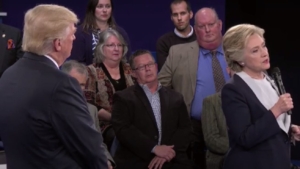The second presidential debate turned into a raucous night as Donald Trump, seeking to stabilize his campaign after the release of inflammatory lewd remarks about woman, attacked Hillary Clinton’s character and honesty over the email scandal and other issues.
Clinton challenged Trump’s fitness for office immediately along with the businessman’s temperament for president in light of the crude remarks Trump made in the now infamous “Access Hollywood” hot mic video. For the first 30 minutes of the debate, Trump repeatedly apologized for the vulgar comments where he openly talked about his treatment of woman, but continued to down play it as just “locker-room talk.”
“I’m very embarrassed by it, I hate it – but it’s locker-room talk,” Trump said.
With the discussion firmly on his comments, Trump would apologize then pivot his remarks to other issues and then attacked Clinton over former President Bill Clinton’s treatment of women.
“If you look at Bill Clinton, far worse – mine are words. His was action,” Trump said. “Bill Clinton was abusive to women. Hillary Clinton attacked those same women and attacked them viciously.”
Many expected Trump to self-implode after the release of video tape and be on the defensive, but he changed tactics and had Clinton on defense, and at one point made her lose her cool with his relentless attacks. Unfortunately for Trump, the first part of the debate was centered on his video comments and his suitability to be president, instead of attacking Clinton’s record.
The Biggest Loser
The real loser of the debate is the American people as both Trump and Clinton spent the entire night attacking each other and little time addressing the core issues of voters including the economy. In fact, neither candidate was asked how he or she would reduce the nearly $20 trillion national debt, and there was little said about how each would revive the anemic U.S. economy – which is experiencing the weakest recovery since the end of the Second World War.
The Rising Cost of Health Care
Both candidates were asked a question on healthcare from one of the undecided voters on stage: “Affordable Care Act, known as Obamacare, it is not affordable. Premiums have gone up. Deductibles have gone up. Co-pays have gone up. Prescriptions have gone up. And the coverage has gone down. What will you do to bring the cost down and make coverage better?”
Neither candidate even remotely addressed what the questioner even asked, i.e., how do you bring costs down and make coverage better?
The failure by both Clinton and Trump to address this question will be felt on November 1st when the next Obamacare enrollment period begins, and when the public finds out they will have higher costs and fewer choices then they had before. Clinton mentioned all the positive aspects of Obamacare, but the negative attributes of the scheme are now being felt and will continue to be felt well into the next administration.
Trump and Clinton on Taxes
The only real discussion on the economy focused on the specific tax provisions that each candidate would change to ensure the wealthiest Americans pay their fair share in taxes.
Trump responded that he would get rid of carried interest, but then quickly pivoted to how Clinton never changed the tax code while serving as a U.S. Senator for eight years, and continued to attack her credibility on the subject.
The last point Trump made was that he would institute a sharp reduction in the tax rate but he never addressed how the wealthy would pay their fair share of taxes.
Clinton’s response to very same question was a stinging rebuke of a Trump’s tax plan as a huge win for the wealthy and corporate America. She repeated her argument than under her prospective tax plan, no one making less than $250,000 will have their taxes raised.
President Obama made the same claim in 2009, “I can make a firm pledge. Under my plan, no family making less than $250,000 a year will see any form of tax increase. Not your income tax, not your payroll tax, not your capital gains taxes, not any of your taxes.” This was proven false, and neither of the two debate moderators (Anderson Cooper and Martha Raddatz) pressed Clinton how her tax plan would be any different from President Obama’s.
Both Fail on Foreign Policy
Finally, after the debate transitioned to foreign policy, primarily centering on the catastrophic Syrian civil war and the fight against ISIS, it was shocking that neither Trump nor Clinton has a remote understanding of the situation on the ground in the Middle East.
Neither candidate has presented a realistic strategy on how to defeat ISIS, nor did they focus on all the other dynamics working against the United States in the region. Both Trump and Clinton never brought up – nor did the moderators mention – that Russia moved a highly mobile S-300 anti-air missile system to the northwestern Syria port of Tartus. Since no other actor in the Syria has aircraft capabilities, this was solely aimed at the United States.
Just last week Russian Major-General Igor Konashenkov threatened to shoot down any aircraft attacking Syrian government forces in a direct hint at any possible U.S. attack on Syrian forces.
The only questions asked on foreign policy centered on Russia, Syria and ISIS, nothing with regard to China and its incursions into the South China Sea. There was also no mention of the potential collapse of the Venezuelan government and its impact on the region, nor the massive wave of undocumented children streaming across the U.S. southern border from Central America.
The real loser in the debate was the American people who will elect either Trump or Clinton as their president. Ultimately, we really don’t how they will govern on core issues of concern to most Americans.
Hopefully, in the third and final debate before the election, those core issues will be addressed.


Leave A Comment
You must be logged in to post a comment.